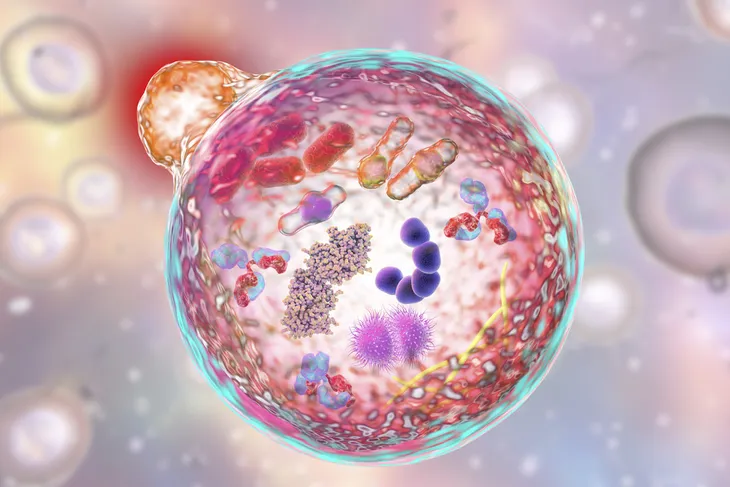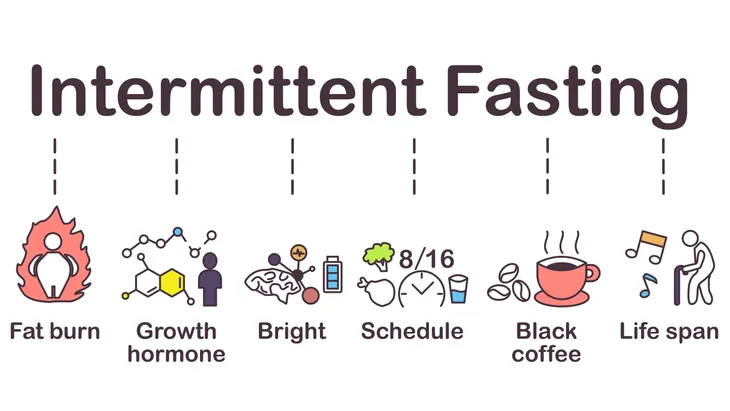While intermittent fasting (IF) has recently become popular, it’s no new concept. This specific eating pattern dates back to the time of ancient hunter-gatherers. Of course, the use of fasting has greatly evolved since then. Today it’s used as a way to lose weight, boost longevity and fight disease, whereas thousands of years ago it was used out of necessity.
So what is intermittent fasting? Healthline describes it as “an eating pattern that cycles between periods of fasting and eating.” There’s less focus on what foods you should eat and more on when you should be eating them. There are many different types of fasting methods, but the most popular are daily 16-hour fasts or fasting for 24-hours, twice a week.
We’re all looking for the next best thing when it comes to health and weight loss, and fasting has definitely caught the attention of many. But like many new fads, we’ve got lots of questions about this one, like what is IF? What are the benefits? And is it even safe? Here’s everything you need to know about fasting…
What is Intermittent Fasting?
Intermittent fasting is not so much a diet, but rather a lifestyle. This is because it doesn’t focus on what you’re eating, but rather when you’re eating it. It’s an eating pattern that cycles between periods of eating and fasting with the intention of helping the body burn fat.
According to Johns Hopkins neuroscientist Mark Mattson, Ph.D, who’s studied intermittent fasting for 25 years, this is a way of life that dates back to prehistoric times. “Before humans learned to farm, they were hunters and gatherers who evolved to survive — and thrive — for long periods without eating,” writes Johns Hopkins Medicine. Fasting has also often used for religious or spiritual reasons, including Islam, Christianity, Judaism and Buddhism, notes Healthline.
People are now turning to fasting to lose weight. Society has changed a lot. Nowadays people find it hard to lose weight thanks to things like computers, television, and easy access to unhealthy foods. We spend more time sitting and eating, and get less exercise. These extra calories put us at risk for things like obesity, type 2 diabetes, heart disease, and other illnesses.
What are the Most Popular Methods?
There are several different intermittent fasting methods, all of which follow the same general rule which is eating for a short period of time and fasting the rest of the time. During these fasting periods, you’re not allowed to consume anything other than water and zero-calorie beverages.
According to Healthline, the three most popular intermittent fasting methods are:
- The 16/8 Method: Sometimes referred to as Leangains protocol, you skip breakfast and only eat during an 8-hour period (i.e. 1 pm to 9 pm). Then fast the remaining 16-hours.
- Eat-Stop-Eat: You must fast for 24-hours once or twice a week. For example, you’d eat dinner one day and then not eat again until dinner the following day.
- The 5:2 Diet: You’re allowed to consume only 500-600 calories on two-non-consecutive days of the week. The other 5 days in the week you may eat normally.
The goal with all of these diets is to reduce calorie intake and encourage weight loss. Ideally, a person will lose weight as long as they aren’t overcompensating with extra calories during their specified eating periods. The most common and easy-to-follow method is the 16/8. It is also the most sustainable, so if you’re new to fasting, this is a good one to start with.
How Does it Work?
The whole premise of fasting is around choosing specific times to eat and not eat. This goes against what we’re normally taught which is to have three meals a day in the morning, afternoon, and evening. “Intermittent fasting contrasts with the normal eating pattern for most Americans, who eat throughout their waking hours,” says Mattson to Johns Hopkins Medicine. “If someone is eating three meals a day, plus snacks, and they’re not exercising, then every time they eat, they’re running on those calories and not burning their fat stores.”
Most people use fasting as a way to lose weight, but it can be used to also improve overall health. When it comes to weight loss, the way fasting works is to prolong meal times so that eventually the body exhausts its sugar stores and starts burning fat. This is called metabolic switching, explains Mattson.
The Effects on Cells and Hormones
The reason fasting has shown health effects is because fasting does things to the body on both a cellular and molecular level. The human body is extremely complex and smart! When the body isn’t getting enough food it will adjust hormone levels to make stored fat more accessible, says Healthline. The cells in your body will also “initiate repair processes and change the expression of genes.”
Healthline outlines the biggest changes seen in the body while fasting:
- Cellular Repair: Your cells will begin a repair process through autophagy. This is the process in which cells digest and remove “old and dysfunctional proteins that build up inside cells.”
- Gene Expression: Any gene changes that occur will affect longevity and help protect against disease.
- Blood Glucose Levels: Sensitivity to the hormone that regulates glucose in the blood improves and levels drop dramatically. Lower hormone levels are what makes stored fat more accessible.
The benefits derived from intermittent fasting are a direct result of these changes in hormone levels, cell function, and gene expression.
Do I Have to Avoid Certain Foods?
One of the biggest and most common questions people have about intermittent fasting is about what they can and can’t eat. Because fasting focuses more on when you’re eating and not what you’re eating, you can still eat a wide range of foods. The tricky part is not eating during times of fasting. The only thing you’re permitted to consume is water and zero-calorie beverages (i.e., black coffee and tea).
Johns Hopkins dietitian Christie Williams, M.S., R.D.N., says this is what she likes most about intermittent fasting. There aren’t food restrictions like there are with other diets. “We want people to be mindful and take pleasure in eating good, nutritious food,” she says. Williams also adds that fasting encourages people to eat with others because shared mealtime experience can also support good health.
It’s important to note that during eating periods you shouldn’t “go crazy,” but rather eat normally. Intermittent fasting is often advertised as a healthy lifestyle to improve overall health, so eating highly processed foods that are high in fat are not encouraged. You’re not going to lose any weight if all you’re eating is high-calorie junk food, fried foods, or treats. According to Williams, one of the best blueprint diets to follow (whether you’re fasting or not) is the Mediterranean diet.
What are the Health Benefits?
While most people are drawn to intermittent fasting as a way to lose weight, there are so many additional benefits. Mattson explains that fasting periods can do more than just burn fat. “When changes occur with this metabolic switch, it affects the body and brain.”
One of his studies published in the New England Journal of Medicine examines how fasting can boost longevity, create a leaner body, and a sharper mind. “Many things happen during intermittent fasting that can protect organs against chronic diseases like type 2 diabetes, heart disease, age-related neurodegenerative disorders, even inflammatory bowel disease and many cancers,” says Mattson.
The main health benefits found in research around intermittent fasting are:
- Improved Thinking and Memory: Studies show intermittent fasting can boost memory in animals and verbal memory in human adults.
- Heart Health: Intermittent fasting has shown improved blood pressure and resting heart rates, as well as other heart-related measurements, says Johns Hopkins Medicine.
- Physical Performance: Men who fasted for 16-hours were able to lose fat while maintaining muscle mass. And mice who were fed on alternate days showed more endurance in running.
- Diabetes and Obesity: Animal studies show intermittent fasting can prevent obesity. In six studies, obese adult humans were able to lose weight through intermittent fasting.
- Tissue Health: Animal studies show intermittent fasting can improve results and reduce tissue damage from surgery.
Healthline also points out many different studies show benefits in weight loss, inflammation, cancer, and anti-aging. However, it’s important to note that all research is still in its early stages. Many studies that have been conducted were small and short-term, or conducted on animals, so the effects on humans may be different. Higher quality human studies are still needed.
It Might Not Work For Everyone
Anyone who has dieted for weight loss likely already knows that restrictive diets have a high fail rate and usually aren’t sustainable. While we all wish there was a one size fits all diet that can help with weight loss and improve health, there isn’t. There’s no denying that intermittent fasting is one of the more extreme diets and lifestyles, so you should consult with a doctor to find out if it’s right for you. If it is, find a way to make it a sustainable lifestyle that won’t need to be stopped abruptly.
For the most part, if the diet is too hard to stick with it likely means it’s too rigid or prescriptive, writes Benjamin D. Horne, Ph.D, M.STAT., M.P.H in an article on SELF. A better option might be to focus on eating more fruits and vegetables and getting more exercise.
Libby Mills, RD, a spokesperson for the Academy of Nutrition and Dietetics also points out that everyone reacts differently both physically and mentally to calorie restriction. “You may not know how your body will respond to, say, low blood sugar,” says Mills to Health.com. “Or, some people find that fasting seems like a piece of cake until around 3 o’clock, and then suddenly cravings come on and you end up eating all sorts of things you normally wouldn’t.”
There are a number of people who shouldn’t try intermittent fasting, and those who do should practice it under the watchful eye of a registered dietitian or doctor.
Is It Safe?
Intermittent fasting is used for many different reasons. Some people use it for weight loss while others are more focused on curing or managing chronic conditions like irritable bowel syndrome, high cholesterol, or even arthritis. The most important thing to know when it comes to safety is that intermittent fasting isn’t for everyone. You must consult a doctor prior to trying any new diet, especially one as radical as fasting.
In fact, the following individuals should avoid intermittent fasting completely:
- Children/teenagers under the age 18.
- Women who are pregnant or breastfeeding.
- Women who are trying to conceive.
- A woman with a history of amenorrhea.
- People with diabetes, low blood pressure, or blood sugar problems.
- People who take medications.
- Individuals who are underweight or have a history of eating disorders.
People outside these categories who want to try intermittent fasting should think of it as a lifestyle change that is meant to improve their overall health and not just quick fix for weight loss. Another important factor that Johns Hopkins Medicine points out is that intermittent fasting has different effects on different people. “Talk to your doctor if you start experiencing unusual anxiety, headaches, nausea, or other symptoms after your start intermittent fasting,” writes the source.
What are the Side Effects of Intermittent Fasting?
While there are many health benefits to intermittent fasting, not surprisingly there can also be some side effects. One of the biggest side effects is that this diet interferes with your hunger cues. “Since people are only allowing themselves to eat in a certain window of time, they are completely ignoring their internal cues of hunger,” says Alissa Rumsey, RD, to Women’s Health. “It causes people to disregard hunger cues, which then means once they are ‘allowed’ to eat, they are starving and it can be hard to stop eating.” While it might be fine for some, for others it could lead to an unhealthy obsession with food.
One of the main benefits boasted by fasters is mental sharpness and alertness, however it can also have the opposite effect. People who fast for long periods of time may feel foggy, experience disrupted sleep, and decreased alertness. Extended fasting can also affect blood sugar levels causing the body to bounce between low and high blood sugar, says Rumsey.
How to Get Started
If intermittent fasting sounds like something you’d be interested in and would like to try it, there’s no one plan to follow. The first thing you need to do is consult your doctor to see if intermittent fasting is safe. You should also consult with a dietitian to learn how to practice this diet safely and what method would work best for you. “Work with a professional who understands your goals and can help you determine what you need to eat for a diet like this to achieve,” says Scott Keatley, RD, of Keatley Medical Nutrition Therapy to Women’s Health.
As we mentioned previously, there are several different methods of intermittent fasting and some are harder than others. The 5:2 diet is quite tricky and involves a lot of calorie restriction for an entire day so it might be better to start with something a little easier to follow like the 16:8 diet. Keatley also recommends shooting for “small changes and small gains as these are most likely to do the least harm and provide the most long-term benefits.”
The main thing to remember is to listen to your body and get a full understanding of what the diet is before jumping in. Don’t push yourself too hard. While fasting can cause some minor side effects at first, if you’re not feeling well or are experiencing serious side effects, fasting is likely not for you. There are many other ways to improve your health and longevity such as not smoking, drinking alcohol in moderation, eating healthy (low salt, low cholesterol diet), and engaging in regular exercise.













